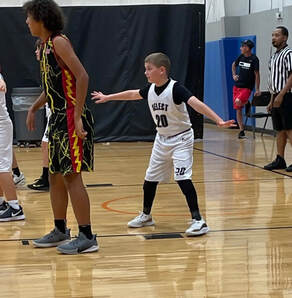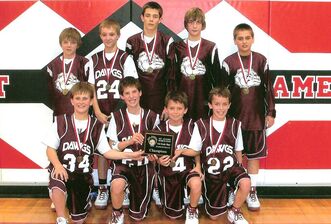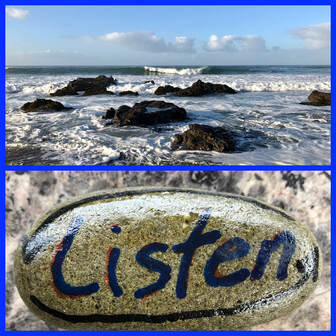Bridging Leadership Lessons from the Workplace and Those Experiences Shaping Today's Youth and Tomorrow's Leaders
"None of us know when the moment is going to present itself. The key is to always be available when it does."  Image by Donald Dodd Image by Donald Dodd A new employee in finance, named Jordan, poked his head into my office and introduced himself. He immediately started talking about my blogs and shared how he loved the basketball analogies I used. He asked my perspective on when there is a last second shot for a game winner and how the focus is always on the person who made or missed the shot. The common narrative focusing on how that person either won or lost the game. But that’s not how it works or how life works. It’s many moments during the game's 40 minutes of playing time. A game that can hold up to 90 minutes of experiences and interactions when you consider talks in the locker room, timeouts, or stoppage of play where a person can have an impact. Let alone the hours of practice and experiences that prepare you for a game that can have an impact at that “One Moment.” So many people are involved directly and indirectly that it should never come down to a single person or that “One Moment” to define a person. As Jordan and I continued to talk, I knew that I would have to make sure I wrote about this topic. So here you go! Andrew Whitworth, a former St. L Rams lineman, talked about these moments during his NFL 2021 Walter Payton Man of the Year recipient speech. “None of us know when the moment is going to present itself. The key is to always be available when it does.” I love this quote and please click on the link to listen to his full speech because he really wasn’t talking about sports. He was talking about life and how sports just happened to be the vehicle that allowed him to positively impact a young man. Sports is a great venue to relate to life, but life is not well represented by a score board. There is so much more to the process and journey than just the goal. One Shining Moment With March Madness in full swing, the NCAA Basketball Tournament provides a great example every night of games and with the annual playing of the “One Shining Moment” song that includes video highlights of the various “one moments” that were captured by the camera. The one verse goes: “One shining moment, it’s all on the line One shining moment, there frozen in time” Those moments captured in the video show the excitement and passion of victory as well as the sorrow and disappointment found in defeat. In March of 2021, our middle son Trey, had his own One Shining Moment, when he was playing in the District Championship and was fouled attempting to shoot a 3 pointer to tie the game. He was fouled with 0.1 seconds on the clock. As a parent, I wasn’t nervous, or scared, or excited. Surprisingly, I was calm. As a coach, I had confidence in his ability to shoot and to knock down big shots. But as a parent, I started to hurt, knowing that if the situation didn’t turn out as I hoped, he would be devastated. Trey calmly knocked down the three free throws to send the game to overtime where they proceeded to win their 3rd district title of his four years in high school. During the interview afterwards Trey brought up that he had missed a 3-point shot to tie it on the previous possession “I had just missed a game-tying three. I thought I had just lost the game. When I went to the line, I didn’t want to lose it again.” Amazing, how in a couple of quick possessions, the mind tricks us into thinking that this singular moment somehow is responsible for the outcome of the game. It's the Team Skip Brock, a Hall of Fame Member of the Missouri Basketball Coaches Association, sent this message in a tweet. “So often in close games, the focus is on the final few possessions. Made/missed FT’s, FG’s, TO’s, Rebounds, late, are most remembered, but those same plays in the early part are equally important to the outcome. Every possession matters.” He captured perfectly what we as coaches, know naturally, but much more clearly when not in the heat of battle. I responded to Coach Brock’s tweet with how I have approached this topic with my own teams. “I always say “one thing” is the difference between winning and losing. Everybody has multiple “one things” that they could have done differently. Minimizing those “one things” over the course of the game will determine the victor. Keep the focus off the individual.” This past weekend, my youngest child Ethan, was playing in a highly competitive basketball tournament in St. Louis, facing a tough team from Indiana. After a great first half where we stretched it out to a 15-point lead, we allowed the team to close to 5 at halftime and gradually gave up the lead late in the game. We were able to survive, recapture the lead and advance to the final four. After the game we were congratulating the players and talking about the game. One of the kids was quiet and when I approached him to give him a fist pound, you can tell he was down. I asked him what was up and didn’t say anything. His mom told me that he was upset about the turnover late in the final minute of the game that allowed them to take the lead. He looked at me and said, ”It could have cost us the game.” I responded, “but it didn’t.” He blurted out “but it could…” and I didn’t let him finish. Sternly, I stated, “But. It. Didn’t!” I proceeded to share with him my thoughts about the One Moment and the One Thing that could have been done differently. I asked if anyone had missed shots. Of course, they had. Did anyone have turnover? Of course, they did. Did anyone let their man score? Of course, they did. I explained that at any moment in the game, one of those “One Moments” goes the other way, and we possibly lose the game. But that is why we play the game. To compete. To get better. To grow. I told him that his focus should be on how to prevent the turnover in the future, not on the turnover itself. Good or bad, the secret is to not hold on to that singular “One Moment", but to identify which of the “One Moments” you need to focus on addressing so that they become positive “One Moments” in the future. For every positive “One Moment” for you, there may be a counter negative “One Moment” for someone else. Your turnover may be a steal for someone else. I ran into Jordan in the hall the other day and told him to be sure to check out the next Hawkeye, our internal company newsletter, as this article will be in there. He was excited and told me that he keeps reading, wondering when I would capture this subject. We began to discuss this topic and other sports related topics and how they relate to work. These types of interactions, these “One Moments” are all around us. They are not the pinnacle of our life. They are not the moments that define us. They are simply part of the many moments that have a profound effect on our journey. Our journey to make sure that these moments have a positive impact Beyond Today.
0 Comments
While I was doing research for an upcoming post, I came across the website for “One Shining Moment” the song that captivates basketball fans across the globe with the conclusion of March Madness. The writer, David Barrett, composed the lyrics on a napkin while waiting for a friend and then spent 15 minutes putting it to music when he returned home. Something that came together so easily, has stood the test of time. The song first appeared on the CBS coverage of the NCAA tournament in 1987 when Keith Smart hit the baseline jumper to lead the Indiana Hoosiers over the Syracuse Orangemen. (Link to the 1987 Championship Game) I have included the lyrics below that perfectly capture that beautiful game of basketball and the thrill of competition. If you are a basketball fan, you must visit the website (CLICK HERE) to learn more about the history, listen to the various recordings of the song, and watch various interviews. Trust me, you will get lost reminiscing about the various tournaments that you have watched. Enjoy! One Shining Moment
Words & Music: David Barrett, Hodges Song Supply/ASCAP The ball is tipped and there you are you’re running for your life you’re a shooting star And all the years no one knows just how hard you worked but now it shows… (in) ONE SHINING MOMENT, IT’S ALL ON THE LINE ONE SHINING MOMENT, THERE FROZEN IN TIME But time is short and the road is long in the blinking of an eye ah that moment’s gone And when it’s done win or lose you always did your best cuz inside you knew… (that) ONE SHINING MOMENT, YOU REACHED DEEP INSIDE ONE SHINING MOMENT, YOU KNEW YOU WERE ALIVE Feel the beat of your heart feel the wind in your face it’s more than a contest it’s more than a race… And when it’s done win or lose you always did your best cuz inside you knew… (that) ONE SHINING MOMENT, YOU REACHED FOR THE SKY ONE SHINING MOMENT, YOU KNEW ONE SHINING MOMENT, YOU WERE WILLING TO TRY ONE SHINING MOMENT….  My last post was targeted at parents who were trying to determine if it was okay to play their child up a grade in sports. This is based on parents trying to challenge and develop their kids putting them in a position where they will have to face tougher competition. They typically are looking for life lessons that they hope will prepare them for high school and beyond. So, on one level, you have the parent challenging their child. On another level you have the trophy chasers who put their high end select travel team into school division tournaments or AAA baseball or softball teams to build up their resume by heading to smaller communities to take on single A teams. That’s not illegal but bordering on being unethical and for sure lacking honor and sportsmanship. Coaches who would rather win against bad teams than lose against good teams fail to do the one thing they are responsible for - develop their players as competitors and people. But there is an even darker side to youth sports, even beyond the craziness of parents in the stands (yes, that will be a future post as well!). Where parents and/or coaches are so blinded by winning or generating fame that they will knowingly bend, break, and trample the rules without a second thought. Now, driven by the power and hype of social media, the new trend is for parents to play their kids DOWN a grade! Welcome to the Crazy World of Sports literally March Madness. Holding kids back a grade is understood when they are young based upon educational, physical, social, or emotional development struggles. Prior to Kindergarten, it is commonly recommended by the school system that boys born in the summer months should wait for the following year to begin school. Some of you may remember almost 20 years ago when a dynamic pitcher took the U.S. by storm throwing a perfect game in the Little League World Series. Danny Almonte was born in the Dominican Republic and moved to the Bronx to be with his father. He led his team to the U.S. championship game but lost when he had used up all of his innings to pitch. He struck out 62 of 72 batters and only gave up 3 hits! A dominant performance for any 12-year-old. But the sad reality is that he wasn’t 12, he was 14. The teams and coaches had complained that the young man didn’t look like a typical 12-year-old and definitely didn’t throw like one. For any of you that have had kids play travel ball, you know the feeling. How many times have you said, “Did he drive here?” “Is she a player coach?” When it came to light, the team had to forfeit all its games and they were stricken from the record books. The rest of the team had to pay the price because a parent was more concerned with their child's fame and success than the rest of the team or simply, honor. Did the coaches know? Did the parents know? What about the kids? Was he able to keep up a like for 2 years never revealing his age? It’s more plausible in this case where birth certificates are not common when moving to a new country. But it isn’t only in those situations. Around 2004, I took a mix of 1st - 3rd grade boys to play in an AAU tournament. We were playing up in the 3rd grade division and in our first game we were throttled something like 60-2. I was amazed at the size of these kids and how in 3rd grade they were shooting step back 3 pointers. Something that wasn’t as prevalent then as it is now. The referee came up to me after the game and said, “Just because this is a kid’s game, doesn’t mean the coaches don’t cheat.” I looked at him quizzically, and he said, “There’s no way those kids are in 3rd grade.” Our next game we were defeated soundly again but it was much more competitive. I talked to the coach before the game about the previous team we played, and he proceeded to tell me that a couple of the kids were 5th graders. He knows this because he coached one of the kids in football! Needless to say, that team did not advance when this was brought to light. Now fast forward to today, with social media highlighting every play. Select teams have media specialists who market their players to all the national websites and sources. It is a huge business where every parent thinks their child is the next LeBron or Zion. With social media highlighting individuals more than the team, and hype versus substance is what is celebrated, parents are looking to get a leg up on the competition - defined as everyone who is not their child! Welcome to the world of reclassifying! Initially, this was seen as a way to prepare for college and common practice with the eastern Prep Schools so players can get another year of development before entering college. For those very gifted high school seniors, some will reclassify to enter college sooner to fast track their way to the NBA and get round the rule requiring a person to be one year removed from high school before entering the draft. But I’m not talking about high school seniors. Parents have begun to reclassify their 7th or 8th grade child, to give them the advantage of being a year older and more developed than their classmates. Many times, they will do this when moving between schools such as Middle School to Junior High. It is not about their development, but the positioning of their child for near term success. These are kids who are already physically developing and may be on the older end of the grade who will then be held back so that they can be a dominant player against kids that are 1 to 2 years younger than them. Interestingly enough, in the basketball community, this isn’t met with outward disdain as you would expect for someone who is trying to game the system. In many cases they applaud the move, typically because they are hoping he will play with their travel team or school team. As an Old School type of basketball fan, I struggle with this mindset. Especially, when the parents and the “Hype Team” surrounding youth basketball shamelessly post highlights of the 15-year-old dominating the 13-year-old team. Parents should know better, and you would think they would feel guilt. But they don’t. You can say the kids should know better, but if it is being pushed by the parent, well, chances are they may have a different view of right and wrong. Plus, when their twitter followers and Instagram posts are being shared, the euphoria can be too much. So, while these parents are clearing the pathway for success today, what will the future hold? What happens when the gym lights go out and the highlight dunk doesn’t translate to the real world? The question is whether the glory they are feeling today will lead to success and impact Beyond Today?  Originally Published: 9/1/2009 When I originally wrote this post in 2009, it was targeted to parents who were trying to determine if it was okay to play your child up a grade in sports. Now, driven by the power and hype of social media, the new trend is for parents to play their kids DOWN a grade! I will save that topic for a follow-up post. Having spent years coaching and leading a youth feeder program, I have watched players and teams come and go. Regardless of the year, there are always some talented players that need to be challenged at a higher level. While the off-season brings opportunity for high level travel teams, there is still a primary focus on developing within your community/school program that will lead to success in high school. In the smaller rural communities, you find the natural allegiance as you move from Elementary School to Junior High to a single High School. Where your current teammates will also be your future teammates. In the larger cities, there are typically options for which high school you will attend. Many schools don’t have a true Junior High team. So, the travel team is the priority and many times you see players transfer high schools to play with their travel ball teammates instead as in our smaller communities, where you are playing with your neighbors. Our programs focus on school ball and are driven for the success of the community. We are talking about the Out State Hoopers. The higher-level players will surely go play on travel teams once their school season is done which will provide additional challenges. But what about during the season? As parents we waiver between our desire to see our child be successful and our desire to protect. Is it better for them to struggle and play against older/stronger competition or for them to be successful against kids their own age? It is a tough question and made tougher when you, the parent, are also the coach. I have had first-hand experience with playing my child up with mixed success. In baseball, my oldest child was physically able to play at the same level but was not ready mentally - especially when you consider he was a summer birthday that did not stay back a year. The reality was that he was typically 1 to 2 years younger than the other kids and if the team played up a grade, he could be 3 years younger. In basketball, he was always a lower end player on the older team but gradually improved to earn more playing time but still not the top performer. When he finally played with a team made up of his own grade and against teams in his grade, he was able to find success. You could see the light turn on in his head as he was able to slow down the game and the work from playing with older kids allowed him to play at a different pace and with different skills than those in his age group. After that, he was able to translate success at that grade level back to playing on the older team as his confidence skyrocketed. There is another instance where a younger basketball player played with an older team and was their point guard and a dominant player at the older level. As the kids on that team moved on to school ball and played with only their grade, they found a huge gap in their team as they did not have a player ready to take over the point guard position. That could have a huge impact on a high school program as gaps exist as the sophomores thru seniors enter the same playing arena. So, when is it okay to play your child up? Well, it depends. It depends on the child; it depends on the child's team, and it depends on what you hope to gain. In our program, we follow the guidance of our High School coaches and their perspective on the child's development. Do they want them staying with their grade and helping to build chemistry and improve as a team? Or do they prefer this player to be challenged so that they can elevate their own game which will encourage others to raise their game to keep up? Below I have listed a series of pros and cons that hopefully you will consider when determining whether your child should play up a grade. Advantages to Playing Your Child Up
Challenges to Playing Your Child Up
Personally, it was not the right thing for him in baseball. It actually hampered his development. In basketball, I feel it helped my child's development initially, but he needed to have success and he was able to achieve that, by playing against his age group. Balancing his playing between the two different age groups worked well for his personal and athletic development. I updated this article at this time because travel basketball and baseball seasons are underway. Also, High School playoffs are nearing an end and for those seniors and their parents, it is tough to see this chapter in their life come to a close. As someone who has already seen three of their kids graduate and have watched countless teams wrap up their careers, it’s a great reminder for you newer parents who are smack dab in the middle of the chaos of youth sports, that this is just a blip in time. While such a big part of your world right now, you will look back and realize that it was an extremely small part of your life and your memory. Ultimately, it’s just a game. A game that prepares them for life, but a game, nonetheless. Enjoy your time and remember that the relationship between the parent and the child is much more important than their success on the court. It is that relationship that will make these memories so special Beyond Today.  I have shared several posts about the power of Jon Gordon’s book, One Word That Will Change Your Life, and this time I will take you back to December of 2016 and explain how I found my first word, LISTEN. My family and I flew to California over the Christmas Break to spend some days in the sleepy, seaside village of Cambria with the in-laws. I have been reading several Jon Gordon books and the latest I downloaded on my iPad was One Word That Will Change Your Life. As I have written before, the book guides you to reflect on your life, where you are and where you want to be. You ask these three questions:
When you have your list compiled and have it thought through, it turns spiritual and directs you to seek quiet, and to pray and ask, “What do you want to do in me and through me?” I have never been very active in my religious beliefs. I have been a believer but never a person who prays. I didn’t regularly read the bible or attend church. I was never comfortable in that aspect of my life but had started gaining interest due to my mentor, Steve Moles. I read the book on the flight and repeated the mantra over and over asking God, “What do you want to do in me and through me?” I didn’t get an answer. One morning I got up early, put in my earbuds, turned on some podcasts, and walked to the rocky ocean shore. The water in Cambria is cold, regardless of the season, and it is not a sandy beach like you have in the southern part of California. I combed the beach looking for shells (there are not any but incredibly smooth stones) and trying to spend time in prayer asking the question and hoping for an answer. The sound of the surf crashing against the rocks in the early morning hours was incredible. So loud that I recorded it on my iPhone and commented how loud it was. Frustrated that I still didn’t have an answer to my One Word, I decided to continue my morning walk through the streets to head back to our rental. I put my earbuds back in and continued the podcast. As I moved away from the shore and along a coastal reserve, an older man walking his dog approached and said something to me. I removed my earbuds and apologized, explaining I didn’t hear him. He said, “The ocean is loud this morning.” I agreed and shared how I recorded the sound of the surf. He responded, “The ocean has a lot to say if you listen.” I chuckled and told him to have a good day, returned my earbuds and continued my walk. When something hit me about what he said. “The ocean has a lot to say if you listen.” So, I turned off the podcast, removed my earbuds and BAM! It hit me just like in the movies as images came flashing in my mind's eye. Listen to the sound of the ocean. Listen to my body as I was overweight and struggling physically. Listen to my mind as I was battling with anxiety and challenges internally to me. Listen to those who are providing guidance to me at work - not just the words but the advice. Listen to those who have different opinions - they have value and deserve to be heard. Listen to my soul that was saying something needed to change. I had chills running up and down my body as I stood there, staring straight ahead as my mind raced - and then I smiled and laughed out loud. I turned around to share this revelation with this older man who was walking his dog… but he wasn’t there. Nowhere to be seen. No house that he could have walked into or a side street that he could have walked down to escape my view. He just wasn’t there. It may be that what felt like only a split second was actually a longer period of time that allowed the older man to move on to the next street or house and disappear. I don’t know. But what I do know is that moment changed me and my outlook. I had a smile on my face the entire walk back and felt an extra bounce in my step as I got back to the house and shared my experience with my family. LISTEN was my One Word in 2017 and served me well. That doesn’t mean that suddenly I became a better listener, it means that I became more aware of my challenges and therefore could remind myself to stop and listen instead of just acting… sometimes! It helped me with relationships as I shared my One Word with others and how I was trying to be better in that area. Sometimes, all you need do is LISTEN to have One Word that will IMPACT you and those you care about Beyond Today. PREVIOUS POSTS ABOUT ONE WORD: One Word Can Have an Impact in 2022 Focus on One Word One Word for the New Year |
AuthorTom Brown - a husband and a father who is simply trying to make a difference. Using my experience as a Manufacturing Executive to connect leadership from the boardroom to the hardwood to help teams grow and develop to make a difference in the lives of others. Archives
May 2024
Categories |
Proudly powered by Weebly

 RSS Feed
RSS Feed

